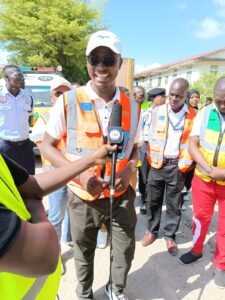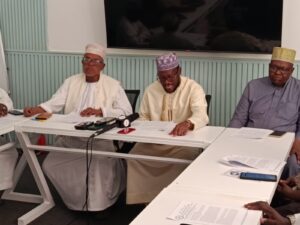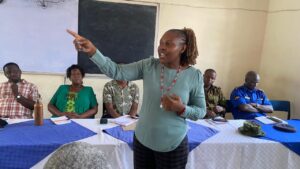Maritime Milestone: Harnessing Kenya-South Korea Maritime Partnership for National Growth

Ambassador Geoffrey Kaituko welcoming the IMO Secretary General Arsenio Dominguez in Nairobi at the State Department of Shipping's office. The Secretary General was in the country early this year to attend the Green Shipping Conference in Mombasa aimed at the implementation of the 2023-IMO GHG Strategy. (Photo/ Courtesy)
By Andrew Mwangura
Email, thecoastnewspaper@gmail.com
The untapped potential of Kenya’s maritime sector lies in strengthening international partnerships, with South Korea-Kenya relationship offering a blueprint for future development.
In the quiet corridors of diplomatic engagement, away from the headlines that dominate our news cycles, Kenya’s maritime future is being meticulously shaped.
The recent partnership between the Technical University of Mombasa (TUM) and Korea Maritime Institute of Fisheries and Technology (KMIFT) marks not just another memorandum of understanding, but a pivotal chapter in Kenya’s blue economy aspirations.
Behind this achievement stands Ambassador Geoffrey Kaituko, the former principal secretary state department of shipping and maritime affairs, whose vision and persistence has advanced Kenya’s maritime interests with remarkable efficacy.
Bridges Across Oceans
This latest academic partnership represents the second significant Kenya-Korea maritime collaboration, following the agreement between Bandari Maritime Academy (BMA) and KMIFT signed in Busan last March.
Such educational partnerships transcend mere institutional cooperation—they represent knowledge transfer that could transform Kenya’s maritime capabilities for generations.
Amb. Kaituko’s diplomatic orchestration yielded additional crucial agreements: a comprehensive Maritime Cooperation and a Fisheries Cooperation memorandums of understanding (MOU) between Kenya and South Korea, both successfully signed by former cabinet secretary Salim Mvurya in June last year.
These agreements lay the groundwork for technology exchange, capacity building, and joint maritime enterprises that could accelerate Kenya’s blue economy development.
Missing Piece
Despite these impressive achievements, one critical agreement remains pending: the Mutual Recognition of Certificates of Competence between Kenya and South Korea.
This agreement, still awaiting conclusion on the Korean side, represents the true gateway to employment opportunities for Kenyan seafarers. Without it, our maritime professionals remain locked out of one of the world’s most robust maritime employment markets.
The significance of this pending agreement cannot be overstated when considering South Korea’s maritime prowess.

South Korea ranks seventh globally in merchant fleet ownership, with vessels totaling approximately 82 million deadweight tonnage. Its shipping companies operate diverse vessel types including container ships, bulk carriers, tankers, and specialized LNG carriers.
South Korean-flagged merchant vessels rank 8th globally by carrying capacity. Its merchant fleet employs approximately 40,000 seafarers across its vessels.
Currently, nearly 60% of crew members aboard Korean-flagged vessels are international seafarers, primarily from the Philippines, Indonesia, Vietnam, and China.
These statistics illuminate the substantial employment potential for Kenyan seafarers if certification recognition is secured.
Every delay in finalizing this agreement represents lost opportunities for qualified Kenyan maritime professionals.
Continued Leadership
The groundwork has been meticulously laid. Now, implementation and follow-through demand attention from current leadership.
Blue economy and maritime affairs cabinet secretary Hassan Ali Joho must prioritise the completion of the mutual recognition agreement. His ministry’s engagement could accelerate the conclusion of discussions on the Korean side, potentially opening thousands of employment opportunities for Kenyan seafarers.
Similarly, the principal secretary Aden Millah has an opportunity to build upon Amb. Kaituko’s foundation by maintaining diplomatic momentum on this critical issue. The final steps toward mutual recognition require persistent, high-level engagement.
We must also acknowledge Ambassador Prof Emmy Jerono Kipsoi, whose support from Seoul has been instrumental in navigating the complex diplomatic landscape.
Her continued advocacy from within South Korea represents Kenya’s most direct channel for advancing these discussions.
Beyond Signatures
Memoranda of understanding hold value only when translated into tangible actions. The partnerships cultivated through Ambassador Kaituko’s efforts must now evolve from diplomatic achievements into practical programs that deliver skills, technology, and employment to Kenya’s maritime sector.
The TUM and BMA must leverage these international partnerships to modernize curriculum, enhance training facilities, and align certification processes with global standards.
Only then will Kenyan maritime professionals be positioned to compete effectively in the international maritime labor market.
Broader Horizon
Kenya’s maritime aspirations extend beyond employment opportunities. As a nation with approximately 640 kilometers of coastline, our economic future is inextricably linked to how effectively we develop our blue economy resources.
The partnerships established with South Korea provide not just immediate benefits but a model for engagement with other maritime powers.
Amb. Kaituko’s diplomatic achievements deserve recognition not just for what they are, but for what they represent; a strategic approach to international partnership that serves Kenya’s long-term development goals.
As new leadership takes the helm at the Ministry of Blue Economy and Maritime Affairs, the foundation laid provides a clear roadmap for advancing Kenya’s maritime interests.

The question now is not whether Kenya can benefit from these partnerships, but whether current leadership will demonstrate the persistence and focus needed to transform diplomatic achievements into economic opportunities for Kenyan citizens.
The missing Mutual Recognition agreement stands as both a challenge and an opportunity—one that deserves immediate and sustained attention.
The author is a maritime policy analyst with expertise in international maritime cooperation and blue economy development.







